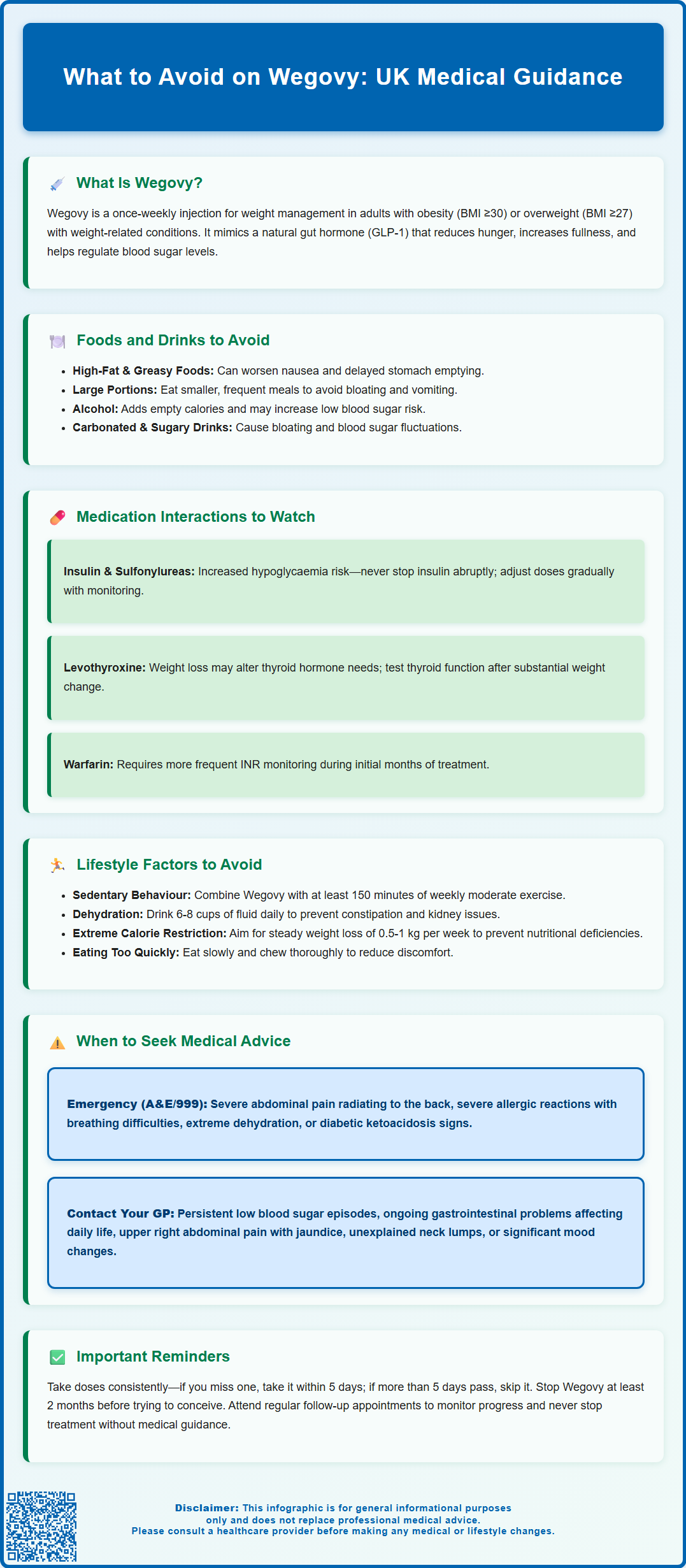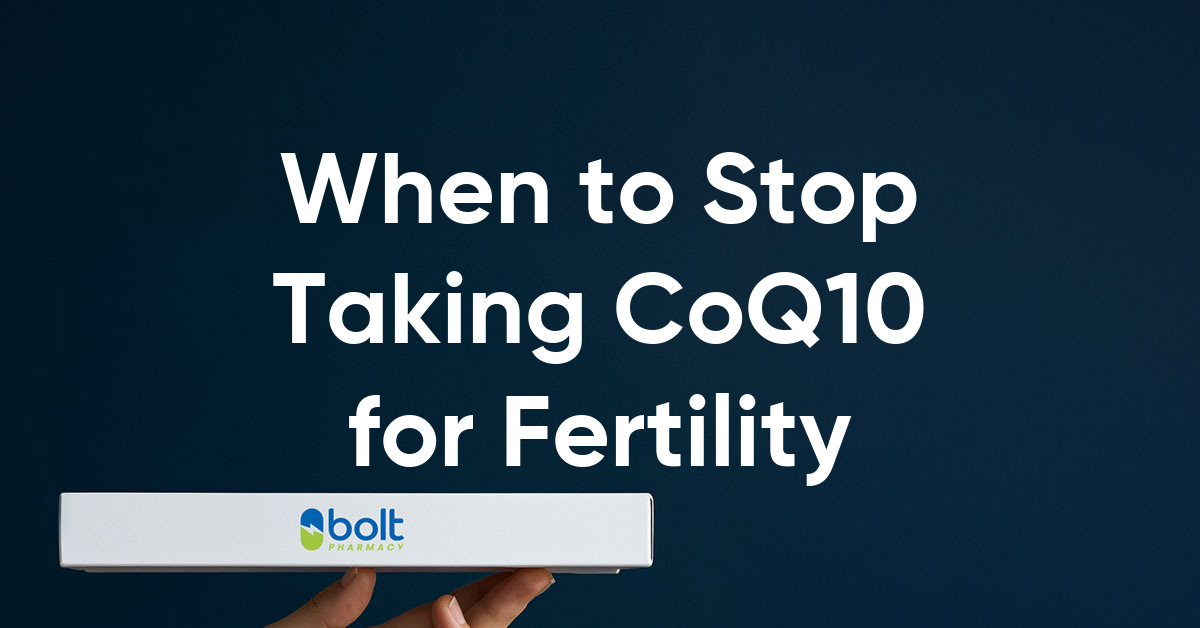Wegovy (semaglutide 2.4 mg) is a once-weekly injection licensed in the UK for weight management in adults with obesity or overweight with weight-related conditions. Whilst highly effective when combined with lifestyle changes, understanding what to avoid on Wegovy is essential for maximising benefits and minimising side effects. Certain foods, medications, and lifestyle factors can interfere with treatment effectiveness or worsen gastrointestinal symptoms such as nausea and delayed gastric emptying. This guide outlines key considerations to help you use Wegovy safely and effectively under specialist supervision.
Summary: Whilst taking Wegovy, avoid high-fat and greasy foods, large portions, excessive alcohol, and certain medication combinations that may worsen gastrointestinal side effects or interfere with treatment effectiveness.
- Wegovy is a GLP-1 receptor agonist that reduces appetite, slows gastric emptying, and aids weight management when combined with lifestyle changes.
- High-fat foods, large meals, and spicy dishes can exacerbate common side effects including nausea, vomiting, and abdominal discomfort.
- Patients taking insulin or sulfonylureas alongside Wegovy require careful monitoring due to increased hypoglycaemia risk.
- Adequate hydration is essential to prevent dehydration, constipation, and acute kidney injury, particularly during gastrointestinal side effects.
- Seek urgent medical attention for severe abdominal pain (possible pancreatitis), allergic reactions, or signs of diabetic ketoacidosis.
- Regular specialist follow-up is required to monitor treatment response, adjust doses, and screen for complications such as gallbladder disease.
Table of Contents
What Is Wegovy and How Does It Work?
Wegovy (semaglutide 2.4 mg) is a prescription medicine licensed in the UK for weight management in adults with obesity (BMI ≥30 kg/m²) or overweight (BMI ≥27 kg/m²) with at least one weight-related comorbidity, such as type 2 diabetes, hypertension, or obstructive sleep apnoea. It is administered as a once-weekly subcutaneous injection and should be used alongside a reduced-calorie diet and increased physical activity.
In the UK, NICE recommends Wegovy within specialist weight-management services, typically for up to 2 years. Lower BMI thresholds may apply for some ethnic groups.
Semaglutide belongs to a class of medications known as glucagon-like peptide-1 (GLP-1) receptor agonists. It works by mimicking the action of the naturally occurring hormone GLP-1, which is released from the gut in response to food intake. The mechanism of action involves several pathways:
-
Appetite regulation: Semaglutide acts on receptors in the brain's appetite centres, particularly the hypothalamus, reducing hunger and increasing feelings of fullness (satiety).
-
Gastric emptying: It slows the rate at which food leaves the stomach, prolonging the sensation of fullness after meals.
-
Glucose regulation: Although primarily used for weight management, semaglutide also enhances insulin secretion in a glucose-dependent manner and suppresses inappropriate glucagon release.
Clinical trials have demonstrated that Wegovy can lead to significant weight loss when combined with lifestyle modifications. The STEP (Semaglutide Treatment Effect in People with obesity) clinical trial programme showed an average weight reduction of approximately 12–15% of initial body weight over 68 weeks. Individual responses vary, and the medication is most effective when patients adhere to dietary and exercise recommendations.
Foods and Drinks to Avoid While Taking Wegovy
While there are no absolute food prohibitions with Wegovy, certain dietary choices can exacerbate gastrointestinal side effects or reduce treatment effectiveness. The most commonly reported adverse effects include nausea, vomiting, diarrhoea, constipation, and abdominal discomfort, particularly during dose escalation. Making informed dietary adjustments can significantly improve tolerability.
High-fat and greasy foods should be limited, as they can worsen nausea and delayed gastric emptying. Foods such as fried items, fatty cuts of meat, creamy sauces, and pastries may sit heavily in the stomach, intensifying discomfort. Similarly, spicy foods can irritate the gastrointestinal tract and trigger or worsen nausea in sensitive individuals.
Large portion sizes are particularly problematic because Wegovy slows gastric emptying. Eating smaller, more frequent meals throughout the day is generally better tolerated than three large meals. Overeating can lead to uncomfortable fullness, bloating, and increased risk of vomiting.
Alcohol consumption warrants careful consideration. Whilst there is no official contraindication, alcohol can:
-
Add empty calories that undermine weight loss efforts
-
Potentially increase the risk of hypoglycaemia in patients also taking insulin or sulfonylureas
-
Exacerbate nausea and dehydration
If you choose to drink alcohol, do so in moderation and be mindful of your body's response.
Carbonated beverages may cause bloating and discomfort due to delayed gastric emptying. Sugary drinks and foods should be minimised not only because they provide excess calories but also because they can cause rapid blood glucose fluctuations.
Focus instead on a balanced diet rich in lean proteins, vegetables, whole grains, and adequate hydration with water. During dose escalation, some people find that bland, simple meals are better tolerated. Keeping a food diary can help identify personal triggers for gastrointestinal symptoms.

Medications That May Interact with Wegovy
Understanding potential drug interactions is crucial for safe and effective use of Wegovy. While semaglutide delays gastric emptying, the UK SmPC notes that clinically relevant absorption interactions are not expected for most oral medicines.
Medications requiring careful consideration include:
-
Oral contraceptives: According to the UK SmPC, no clinically relevant effect on combined oral contraceptives (ethinylestradiol/levonorgestrel) has been observed with semaglutide. Additional contraceptive methods are not specifically required when starting Wegovy.
-
Levothyroxine: There is no known direct interaction between subcutaneous semaglutide and levothyroxine. However, significant weight loss may affect thyroid hormone requirements. Consider thyroid function testing after substantial weight change or if symptoms develop.
-
Warfarin and other anticoagulants: The SmPC indicates no clinically significant effect on warfarin pharmacokinetics, but changes in diet and weight loss can affect INR (International Normalised Ratio). More frequent monitoring may be prudent, particularly in the first few months of treatment.
Diabetes medications require particular attention. If you are taking insulin or insulin secretagogues (such as sulfonylureas like gliclazide or glimepiride), there is an increased risk of hypoglycaemia when combined with Wegovy. The MHRA advises that insulin doses should not be abruptly reduced or stopped when initiating GLP-1 receptor agonists, as this can increase the risk of diabetic ketoacidosis (DKA). Dose adjustments should be made gradually with close blood glucose monitoring.
There is no significant interaction with metformin or SGLT2 inhibitors. Using DPP-4 inhibitors alongside GLP-1 agonists is generally not recommended due to overlapping mechanisms without additional benefit.
Medications that slow gastric motility (such as opioid analgesics, anticholinergics, or certain antidepressants) may have additive effects with Wegovy, potentially worsening gastrointestinal symptoms.
Wegovy should not be used with other GLP-1 receptor agonists or other semaglutide-containing products. Always inform your healthcare provider of all medications, including over-the-counter medicines, herbal supplements, and vitamins, before starting Wegovy.
Activities and Lifestyle Factors to Avoid on Wegovy
Certain lifestyle behaviours and activities can compromise the effectiveness of Wegovy or increase the risk of adverse effects. A holistic approach to weight management extends beyond simply taking the medication.
Sedentary behaviour should be minimised. Whilst Wegovy facilitates weight loss through appetite suppression, combining it with regular physical activity enhances results, improves cardiovascular health, and helps maintain muscle mass during weight loss. UK Chief Medical Officers' guidelines recommend at least 150 minutes of moderate-intensity activity weekly. Avoiding exercise entirely may result in suboptimal weight loss and loss of lean body mass rather than fat mass.
Dehydration is a significant concern, particularly if experiencing gastrointestinal side effects such as vomiting or diarrhoea. Inadequate fluid intake can lead to:
-
Worsening constipation
-
Acute kidney injury, especially in those with pre-existing renal impairment
-
Dizziness and fatigue
-
Gallstone formation (rapid weight loss is a risk factor)
Aim for 6-8 cups (about 1.5-2 litres) of fluid daily, unless advised otherwise by your healthcare provider (e.g., if you have heart or kidney conditions). Increase intake during hot weather or physical activity.
Skipping doses or irregular administration reduces treatment efficacy. According to the Wegovy SmPC, if you miss a dose and it has been less than 5 days, take it as soon as possible. If more than 5 days have passed, skip that dose and resume your regular schedule. Never double up on doses.
Rapid eating or not chewing food thoroughly can exacerbate feelings of fullness and discomfort due to delayed gastric emptying. Practise mindful eating: eat slowly, chew thoroughly, and pay attention to satiety signals.
Ignoring side effects or attempting to "push through" severe symptoms is inadvisable. Whilst mild nausea often improves with time, persistent or severe gastrointestinal symptoms may require dose adjustment or temporary treatment interruption.
If you are taking insulin or sulfonylureas alongside Wegovy, be cautious about driving or operating machinery if you experience hypoglycaemia.
Extreme calorie restriction beyond what is recommended can lead to nutritional deficiencies, muscle loss, and is generally unsustainable. Work with a dietitian to establish an appropriate calorie deficit that supports steady, healthy weight loss of approximately 0.5–1 kg per week.
When to Seek Medical Advice While Using Wegovy
Whilst most people tolerate Wegovy well, certain symptoms require prompt medical attention. Being aware of warning signs ensures timely intervention and prevents serious complications.
Seek urgent medical attention (A&E or call 999) if you experience:
-
Severe abdominal pain, particularly if persistent and located in the upper abdomen, potentially radiating to the back — this may indicate pancreatitis, a rare but serious side effect. Other signs include persistent vomiting and feeling generally unwell.
-
Signs of severe allergic reaction (anaphylaxis): difficulty breathing, swelling of the face, lips, tongue or throat, severe rash, or feeling faint.
-
Symptoms of severe dehydration: extreme thirst, very dark urine, dizziness, confusion, or reduced urine output, especially if accompanied by persistent vomiting or diarrhoea.
-
Symptoms of diabetic ketoacidosis (DKA): nausea, vomiting, abdominal pain, breathlessness, confusion – particularly if insulin doses have been recently reduced.
Contact your GP or diabetes specialist promptly if you notice:
-
Symptoms of hypoglycaemia (if taking insulin or sulfonylureas): trembling, sweating, confusion, rapid heartbeat, or feeling unusually hungry. Recurrent episodes require medication adjustment.
-
Persistent or worsening gastrointestinal symptoms that do not improve after the first few weeks or that significantly impact your quality of life.
-
Signs of gallbladder problems: pain in the upper right abdomen, yellowing of skin or eyes (jaundice), fever, or clay-coloured stools. Rapid weight loss increases gallstone risk.
-
Changes in vision or symptoms of diabetic retinopathy worsening (if you have diabetes).
-
Unexplained lumps in the neck, hoarseness, or difficulty swallowing — thyroid tumours have been observed in animal studies, though the relevance to humans is uncertain. Any thyroid changes should be evaluated.
-
Mood changes, depression, or suicidal thoughts — report any significant changes in mental health.
-
Symptoms of acute kidney injury: reduced urination, swelling in legs or ankles, or unusual fatigue.
Wegovy should not be used during pregnancy or breastfeeding. If planning pregnancy, stop Wegovy at least 2 months before attempting to conceive.
Regular follow-up appointments are essential for monitoring weight loss progress, adjusting doses, managing side effects, and screening for complications. Your healthcare provider will typically review your response after 3–6 months to determine whether continuing treatment is appropriate. Do not stop Wegovy without medical advice, as this can lead to relapse of appetite and weight gain.
Report any suspected side effects to the MHRA Yellow Card Scheme (yellowcard.mhra.gov.uk).
Frequently Asked Questions
Can I drink alcohol whilst taking Wegovy?
There is no official contraindication to alcohol with Wegovy, but it should be consumed in moderation as it adds empty calories, may worsen nausea, and can increase hypoglycaemia risk if you are also taking insulin or sulfonylureas.
Do I need to avoid any specific foods on Wegovy?
There are no absolute food prohibitions, but limiting high-fat, greasy, and spicy foods, along with eating smaller portions, can significantly reduce gastrointestinal side effects such as nausea and delayed gastric emptying.
Can I take other medications with Wegovy?
Most medications can be taken with Wegovy, but insulin and sulfonylureas require dose adjustment and monitoring due to hypoglycaemia risk. Always inform your healthcare provider of all medications, including over-the-counter products and supplements, before starting treatment.
The health-related content published on this site is based on credible scientific sources and is periodically reviewed to ensure accuracy and relevance. Although we aim to reflect the most current medical knowledge, the material is meant for general education and awareness only.
The information on this site is not a substitute for professional medical advice. For any health concerns, please speak with a qualified medical professional. By using this information, you acknowledge responsibility for any decisions made and understand we are not liable for any consequences that may result.
Heading 1
Heading 2
Heading 3
Heading 4
Heading 5
Heading 6
Lorem ipsum dolor sit amet, consectetur adipiscing elit, sed do eiusmod tempor incididunt ut labore et dolore magna aliqua. Ut enim ad minim veniam, quis nostrud exercitation ullamco laboris nisi ut aliquip ex ea commodo consequat. Duis aute irure dolor in reprehenderit in voluptate velit esse cillum dolore eu fugiat nulla pariatur.
Block quote
Ordered list
- Item 1
- Item 2
- Item 3
Unordered list
- Item A
- Item B
- Item C
Bold text
Emphasis
Superscript
Subscript












